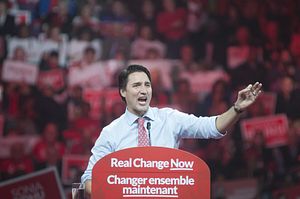Justin Trudeau’s recent election as Canada’s new prime minister has caused much speculation on the political future of the country. The 44-year-old politician, son of a former Liberal prime minister and political heavyweight Pierre Trudeau, has surprised many observers by having inherited his father’s flamboyance and charisma as well as his political staying power. (Not to forget his skill in the ring; Trudeau Jr. unexpectedly beat conservative Patrick Brazeau in a charity boxing match a short while ago.)
Much of the election campaign was driven by domestic issues, with Canada’s engagement the Middle East and the Arctic taking up what bandwidth existed for foreign policy. During the campaign period’s only foreign policy debate, arranged on September 26, the Asia-Pacific was barely discussed at all.
That doesn’t mean that Asia won’t be an important part of Trudeau’s foreign policy. Canada is a party to the Trans-Pacific Partnership, a massive free-trade agreement with several East Asian states, including Japan, Vietnam and Malaysia. The Arctic, a region which Trudeau has pledged to prioritize, is rapidly gaining the attention of several Asian states. A large and increasing part of Canada’s electorate boasts some form of Asian heritage, which could influence policies toward the region. However, it is Ottawa’s relationship with Beijing which represents Canada’s most important interest in the region.
So what will Trudeau’s Asia policies look like? Here are three areas to watch.
1. Canada will probably ratify the TPP.
Unlike Bernie Sanders, his co-leftist south of the border, Trudeau has cautiously defended the deal in principle, but has previously reserved the right to withdraw from negotiations if the finalized clauses didn’t meet Canadian standards. There have been fears from particularly the automotive industry and agricultural lobby that Canadian jobs will be outsourced and products will be displaced by cheap Asian imports. Trudeau has also accused outgoing Prime Minister Stephen Harper of having conducted the negotiations in secret, without involving parliament. According to Trudeau, “The Harper Conservatives have failed to be transparent through the entirety of the negotiations – especially in regards to what Canada is conceding in order to be accepted into this partnership. We’re going to have to take a long hard look at the details of the deal.”
After the Liberal win, however, it seems like the new Liberal government will accept the TPP. During the congratulatory phone conversation between U.S. President Barack Obama and Trudeau, the deal was an important topic. According to the White House, “they noted the successful conclusion of Trans-Pacific Partnership negotiations and the need to move forward with implementing the high standards of the agreement, which promises to boost economic growth and support good-paying jobs on both sides of the border.” This indicates that Trudeau will support the agreement. Furthermore, Trudeau has previously stated that Liberal MPs will be unable to exercise a free vote when it comes to the TPP, which will help ensure that the deal will pass Parliament.
2. Canada’s relationship with China will improve
China represents the single most important relationship for Ottawa in East Asia. The country is Canada’s second-largest trading partner. Canada is an important source of natural resources (particularly timber, rare earths, and oil), high-tech manufactured goods, and advanced technology for China. Chinese investments represent a significant part of foreign direct investment in Canada’s economy. This notably includes hydrocarbons and Canada’s advanced manufacturing sector.
Chinese-Canadians make up roughly 5 percent of Canada’s population, and are becoming an increasingly important part of the country’s political life. Many of these Canadians have families and economic ties to China (particularly in Hong Kong and Guangdong) and support greater freedom of movement and business with the country. However, they are also vocal critics of the country’s human rights record. Back in 2013, Trudeau stated that he had “a level of admiration … for China because their basic dictatorship is allowing them to actually turn their economy around on a dime.” This caused a backlash from the Canadian-Asian community, who demanded that Trudeau apologize.
3. Trudeau will probably strengthen Canada’s military presence in the Pacific
Unlike several other U.S. Pacific allies such as Australia, the Philippines, and Japan, Canada has not figured heavily in the U.S. “Pivot to Asia.” Although it has participated in Rim of the Pacific (RIMPAC) naval exercises, most recently in 2014, most of Canada’s international military efforts have been focused on NATO operations in Afghanistan and Iraq/Syria.
However, the Liberal Party has stated that it will scrap Canada’s participation in the F-35 Joint Strike Fighter project. Much of the F-35’s funding will instead go into expanding and refurbishing the Canadian Navy. According to the Liberal Party, “These investments will ensure that the Royal Canadian Navy is able to operate as a true blue-water maritime force.” The Libary Party has further stated that it will withdraw its fighters from Syria (although not its training missions and humanitarian aid)
Furthermore, Trudeau stated that he will significantly increase Canada’s participation in peacekeeping and humanitarian assistance/disaster relief missions. Put together, this could mean a larger Canadian military engagement in the Pacific, although mostly in a UN and humanitarian capacity. Canadian troops were involved in the humanitarian mission in the Philippines in the aftermath of Typhoon Haiyan and have traditionally been a large source of UN peacekeepers as well. For these reasons, Canada will continue to remain an important player in the Pacific.
Despite not having played a central part in the election itself, Asia is sure to be an important part of Trudeau’s tenure. Asia is important to Canada, whether its politicians acknowledge it or not.

































